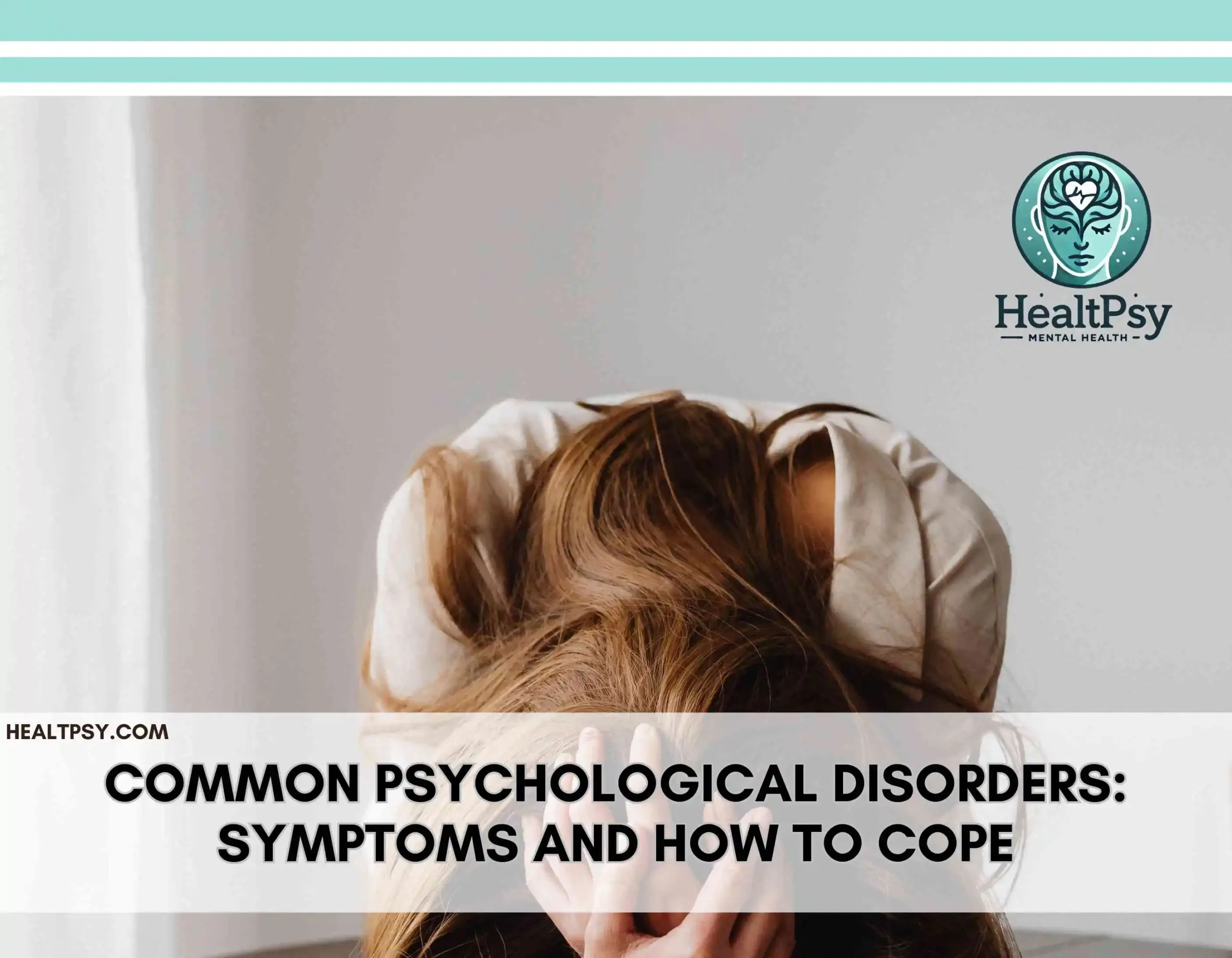Common Psychological Disorders: Symptoms and How to Cope
Introduction
Psychological disorders, also known as mental disorders, are conditions that affect a person’s thinking, emotions, behavior, and overall well-being. These disorders can interfere with daily functioning, relationships, and productivity. According to the World Health Organization (WHO), nearly one in four people worldwide will experience a psychological disorder at some point in their lives. Understanding these conditions, their causes, and available treatment options is crucial for maintaining mental health and seeking proper support.
Types of Psychological Disorders
Psychological disorders can be classified into various categories based on symptoms and underlying causes. Below are some of the most common types:
1. Anxiety Disorders
Anxiety disorders are characterized by excessive fear, worry, and nervousness. Common types include:
- Generalized Anxiety Disorder (GAD): Persistent and excessive worry about daily activities.
- Social Anxiety Disorder: Intense fear of social interactions.
- Panic Disorder: Recurrent panic attacks with sudden feelings of terror.
- Phobias: Irrational fear of specific objects, places, or situations.
2. Mood Disorders
Mood disorders affect an individual’s emotional state and include:
- Major Depressive Disorder (Depression): Persistent sadness, loss of interest, and fatigue.
- Bipolar Disorder: Episodes of extreme mood swings, from mania to depression.
- Seasonal Affective Disorder (SAD): Depression occurring during specific seasons, often in winter.
3. Personality Disorders
Personality disorders influence how individuals perceive and interact with the world. Examples include:
- Borderline Personality Disorder (BPD): Unstable moods, relationships, and self-image.
- Narcissistic Personality Disorder: Excessive need for admiration and lack of empathy.
- Antisocial Personality Disorder: Disregard for rules, impulsivity, and manipulative behavior.
4. Psychotic Disorders
Psychotic disorders cause distorted thinking and perception, including:
- Schizophrenia: Symptoms include hallucinations, delusions, and disorganized thinking.
- Schizoaffective Disorder: Combination of schizophrenia symptoms with mood disorder episodes.
5. Eating Disorders
Eating disorders involve unhealthy eating behaviors and body image concerns. Common examples include:
- Anorexia Nervosa: Severe restriction of food intake due to fear of gaining weight.
- Bulimia Nervosa: Binge eating followed by purging.
- Binge Eating Disorder: Recurrent episodes of excessive eating without purging.
6. Trauma and Stress-Related Disorders
These disorders develop after experiencing traumatic events. The most common is:
- Post-Traumatic Stress Disorder (PTSD): Persistent distress following trauma, often with flashbacks and nightmares.
Causes of Psychological Disorders
Psychological disorders result from a combination of biological, environmental, and psychological factors. Some key causes include:
1. Genetic Factors
Certain mental illnesses have a hereditary component. Individuals with a family history of disorders like depression or schizophrenia may have a higher risk of developing similar conditions.
2. Brain Chemistry Imbalance
Neurotransmitters like serotonin, dopamine, and norepinephrine play a vital role in mood regulation. An imbalance in these chemicals can lead to disorders such as depression and anxiety.
3. Childhood Trauma and Abuse
Experiencing trauma, neglect, or abuse during childhood significantly increases the likelihood of developing psychological disorders later in life.
4. Chronic Stress
Prolonged exposure to stressors, such as financial difficulties, workplace pressure, or unstable relationships, can contribute to anxiety and mood disorders.
5. Substance Abuse
Alcohol and drug use can trigger or exacerbate psychological disorders. Conditions like addiction, depression, and psychosis can develop as a result of substance misuse.
6. Neurological and Medical Conditions
Certain medical conditions, such as brain injuries, hormonal imbalances, or chronic illnesses, may contribute to the onset of mental health disorders.
Effects of Psychological Disorders
Psychological disorders can significantly impact various aspects of life, including:
- Personal Well-being: Individuals may struggle with self-care, motivation, and emotional stability.
- Relationships: Interpersonal conflicts, isolation, and difficulty maintaining social connections.
- Work and Productivity: Difficulty concentrating, absenteeism, and decreased job performance.
- Physical Health: Increased risk of heart disease, weakened immune function, and sleep disturbances.
Treatment for Psychological Disorders
Several effective treatments are available for psychological disorders, depending on their severity and type. Common treatment options include:
1. Psychotherapy (Talk Therapy)
Therapy is one of the most effective treatments for mental health conditions. Different types of psychotherapy include:
- Cognitive Behavioral Therapy (CBT): Helps individuals change negative thought patterns and develop coping strategies.
- Dialectical Behavior Therapy (DBT): Focuses on emotional regulation and distress tolerance, particularly for borderline personality disorder.
- Psychodynamic Therapy: Explores past experiences to understand current emotional difficulties.
- Exposure Therapy: Used to treat phobias and PTSD by gradually exposing individuals to feared situations in a controlled manner.
2. Medication
Psychiatrists may prescribe medications to manage symptoms, including:
- Antidepressants: Used for depression and anxiety disorders (e.g., SSRIs like Prozac and Zoloft).
- Anti-anxiety Medications: Such as benzodiazepines for short-term relief of anxiety.
- Mood Stabilizers: Used to treat bipolar disorder.
- Antipsychotic Medications: Prescribed for schizophrenia and severe mood disorders.
3. Lifestyle Modifications
Maintaining a healthy lifestyle can significantly improve mental health. Recommended changes include:
- Regular Exercise: Physical activity boosts endorphins, reducing symptoms of depression and anxiety.
- Balanced Diet: Nutrient-rich foods support brain function and mood regulation.
- Adequate Sleep: Poor sleep is linked to increased mental health issues.
- Mindfulness and Meditation: Practicing mindfulness helps reduce stress and improve focus.
4. Support Groups and Social Connections
Engaging with peer support groups or community organizations can provide emotional support and practical coping strategies.
5. Hospitalization and Intensive Care
For severe cases, such as suicidal ideation or psychotic episodes, hospitalization may be necessary for intensive care and stabilization.
Preventing Psychological Disorders
While not all psychological disorders are preventable, certain practices can reduce the risk and severity of symptoms:
- Stress Management: Practicing relaxation techniques, deep breathing, and time management can help reduce stress.
- Early Intervention: Seeking help at the first signs of mental distress prevents worsening conditions.
- Healthy Social Interactions: Building strong support networks can buffer against psychological distress.
- Education and Awareness: Learning about mental health helps recognize early symptoms and encourages seeking help.
Scientific Insights on Psychological Disorders
- A study published by the American Psychological Association (APA) found that CBT is 60-80% effective in treating anxiety and depression.
- Research from the World Health Organization (WHO) indicates that early intervention reduces the long-term impact of psychological disorders by up to 40%.
- A meta-analysis in the Journal of Clinical Psychiatry found that mindfulness-based therapy significantly reduces symptoms of anxiety and depression.
Conclusion
Understanding Psychological Disorders is essential for promoting mental well-being and seeking appropriate treatment. These conditions affect millions worldwide, but with early intervention, therapy, and lifestyle adjustments, individuals can manage symptoms and improve their quality of life. Raising awareness, breaking stigmas, and providing access to mental health resources are key steps toward a healthier society.
For further reading, visit APA Psychological Disorders Guide and WHO Mental Health Resources.
you might also like




